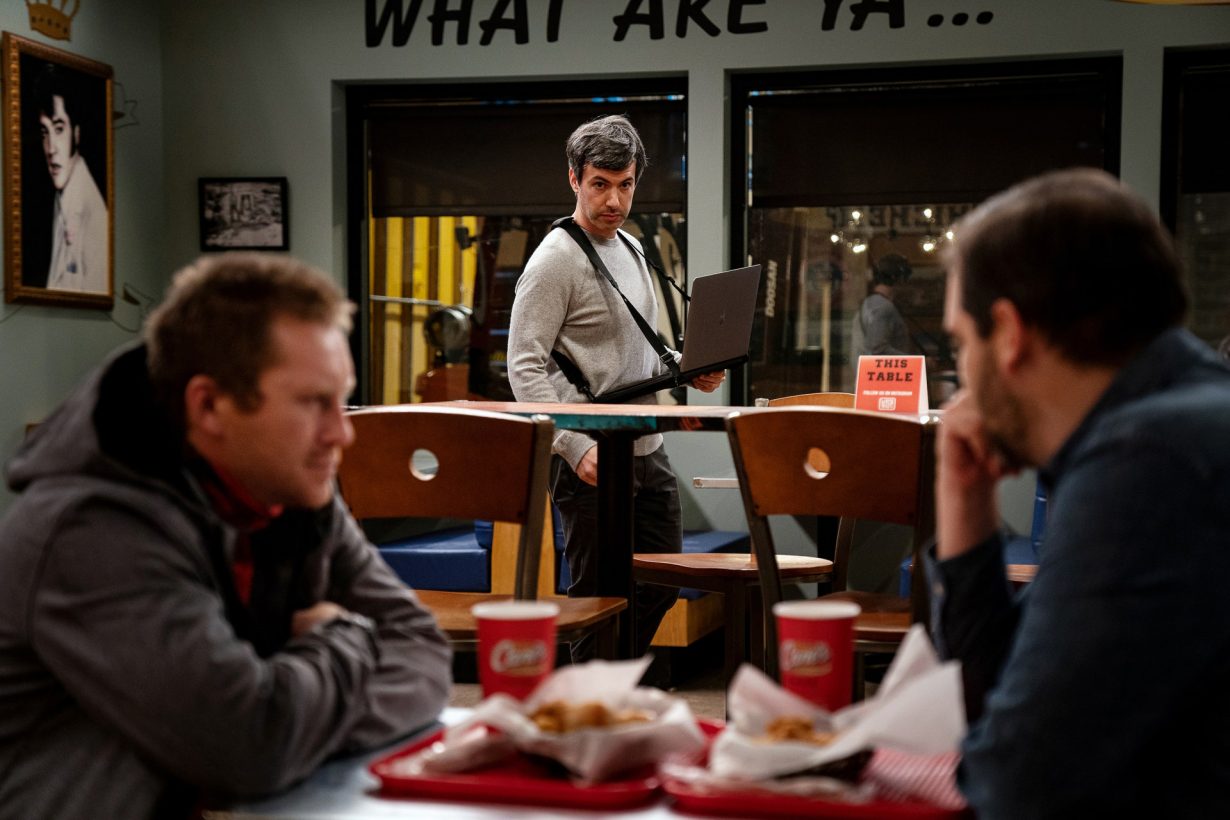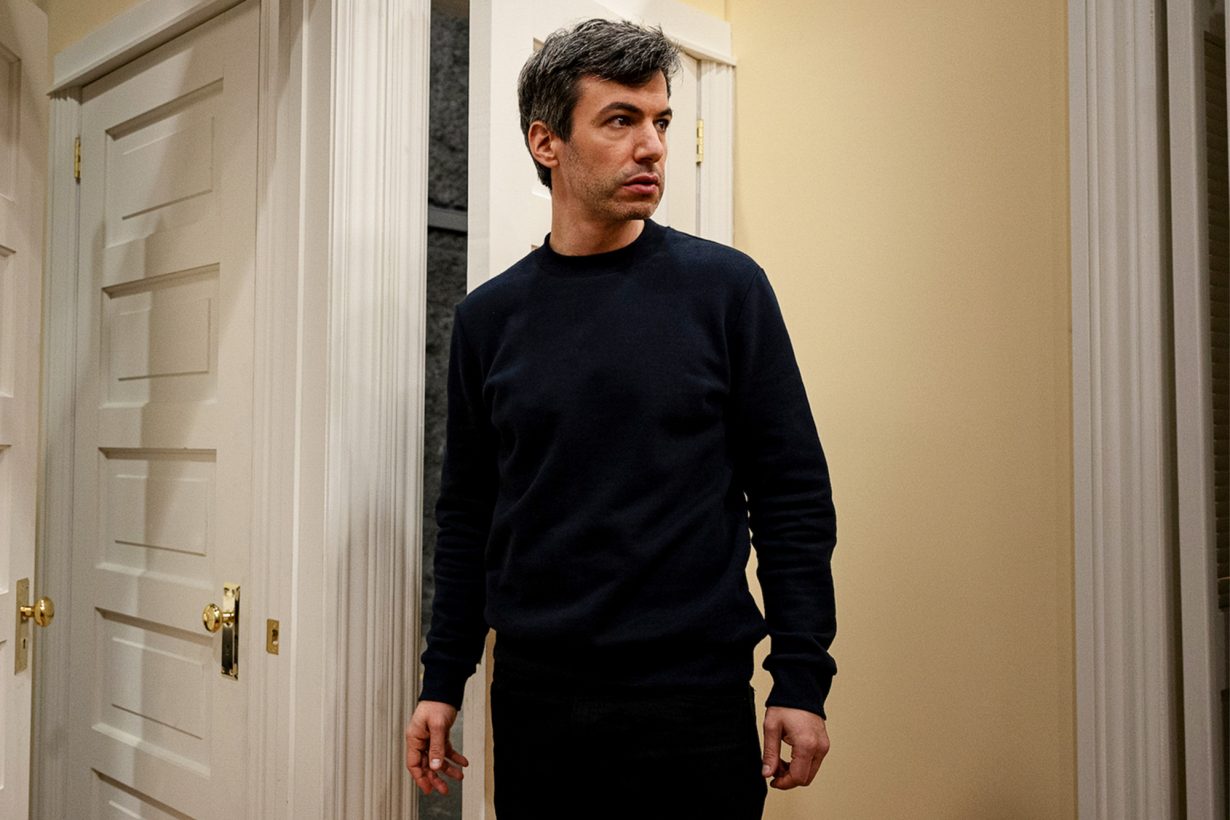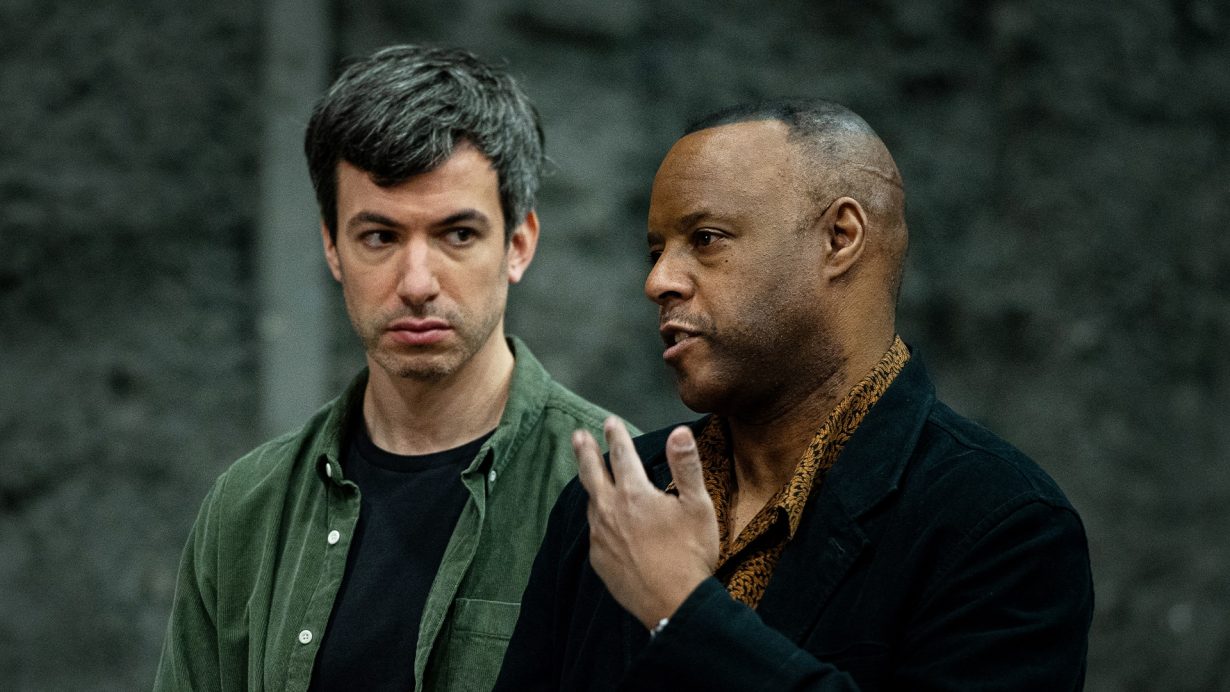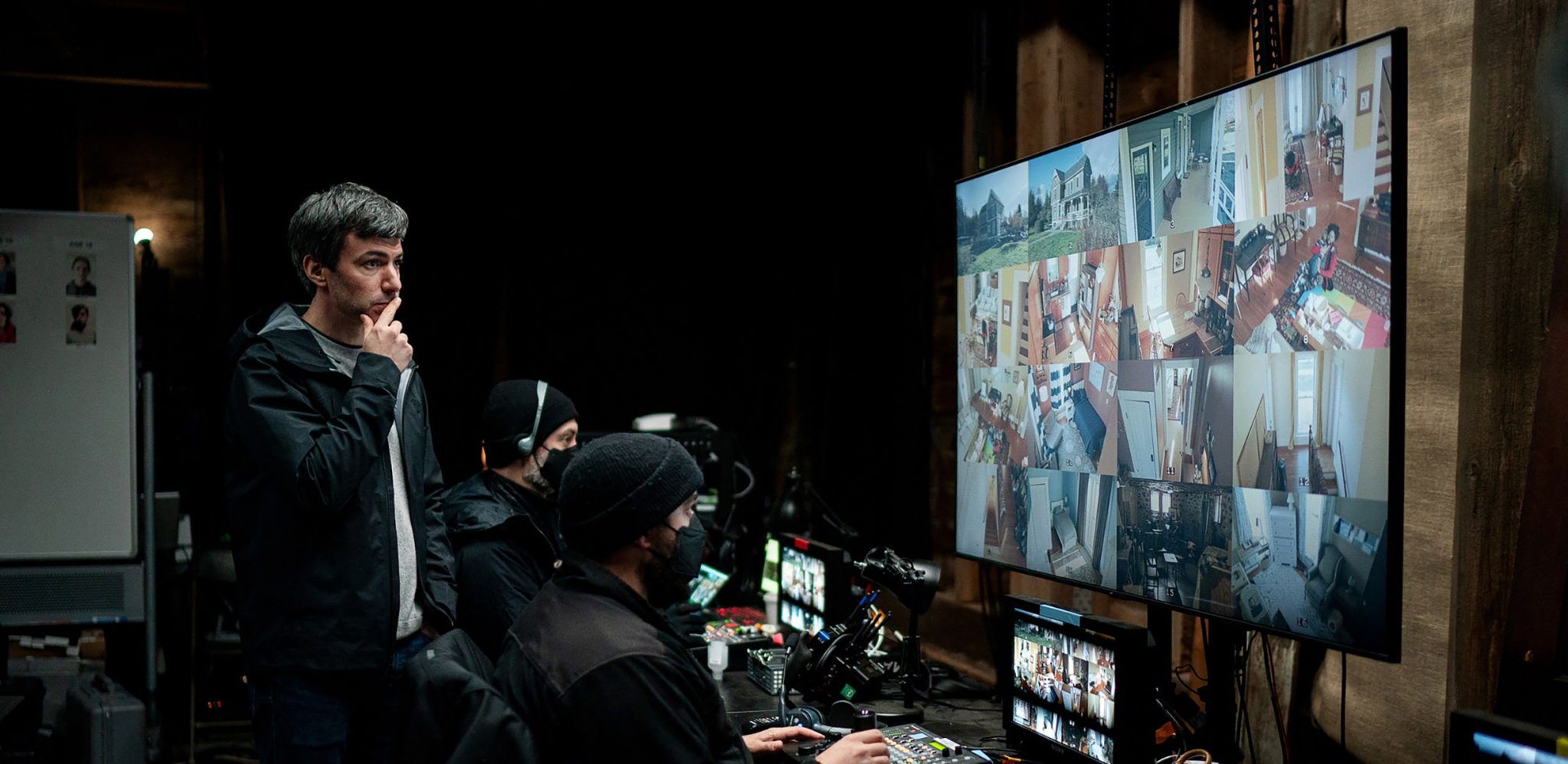What is The Rehearsal really about?
If Nathan Fielder and Walter Benjamin had been alive at the same time, I am certain that Benjamin would have written one of those long essays about him like the ones he wrote about Kafka, or Karl Kraus – an essay which starts with some bewitching anecdote from Jewish history, and then goes on to discuss its subjects’ work in elusive, enigmatic terms, relating it constantly to some never-quite-specified ideal of Messianic justice, or language, or the law. It would have been a powerful thing, and it would have drawn out some deep truth about Fielder’s work, and above all else – it would have given him the critic he deserves.
There has been a lot of discourse surrounding Fielder’s brilliant new HBO series, The Rehearsal (2022), but for the most part this discourse has singularly failed to match up to its object. For those of you who haven’t heard about The Rehearsal yet, its basic premise is this: Nathan Fielder, an awkward man with a rather shallow affect who makes odd TV shows, sweeps into the life of some unsuspecting ordinary human being, to help them through a problem, or to make a decision, by allowing them to ‘rehearse’ whatever situation they are confronting ahead of time – with actors, on a set simulating, say, the bar in which Nathan’s subject hopes to have a difficult conversation with a friend (in what follows, I will refer to Fielder’s in-show persona as ‘Nathan’, and the man himself as ‘Fielder’ – although to be clear, the boundaries between the two are always kept, by Fielder, deliberately blurred: as an audience we are supposed to believe that Nathan is an only slightly exaggerated version of the actual Fielder – which may well, of course, be true).
Ostensibly, the idea is that the person being gifted the ‘rehearsal’ will be able to live through all the possibilities their situation is likely to show up – to prepare them sufficiently, perfectly, for doing whatever they are supposed to be doing ‘in the moment’. In the first episode, Nathan helps Kor, a bar trivia devotee, reveal to his quizzing friend that he only has a bachelor’s degree – not a master’s, as he had previously claimed.

But the show quickly becomes about a whole lot more than that. In the opening few minutes, after Nathan is first seen meeting Kor, he is revealed to have been rehearsing the interactions he just had beforehand, on a set designed to look exactly like Kor’s apartment. Later, Nathan begins to fret that his methods are imperfect, that his ‘rehearsals’ cannot, for instance, accurately simulate the sorts of emotions his subjects are likely to be feeling when they undergo the real thing. He begins to insist on complete accuracy in set design; he begins to manufacture situations to allow his subjects to feel the same emotions towards his actors, that they would towards the people they are doing the ‘real’ thing with.
Layers upon layers of reality begin to pile up on top of each other: a vertiginous mise en abyme of fakes struggling, as much as they can, to resemble the real thing. In one episode, Nathan is seen training a class of actors in his methods. Immediately, he begins to worry what his students think of him – and so he decides to place himself in their position, perfectly recreating his classroom with a fake Nathan in front, teaching the real one, now posing as one of his students. The real Nathan gets his students to – effectively – stalk some random stranger so they can ‘play’ them: he arranges for them to do their jobs, to live in simulations of their apartments. And so the fake Nathan leads his fake student, played by Nathan, to the Japanese restaurant where he will be working for a week (really working, but also pretending); to the simulated version of the simulated apartment Nathan has just been seen leading his own actual student to, where actors are playing the actors who, across town, are posing as the room-mates of the person Nathan’s own actual student is pretending to be… If you are thinking Synecdoche, New York (2008) right now: well yes, that is the obvious comparison – except that this isn’t a film; it is effectively a reality show (albeit one that is, essentially, about its own unreality; its own failure).
The discourse around the show has primarily revolved around the question of whether or not it is ‘exploitative’ – especially after one of its participants, Robbin Stone, did an interview with Vice complaining about how he was portrayed (for what it’s worth, Stone is seen driving after smoking weed, and constantly justifies what he is thinking and feeling with tangential references to numerology; when his room-mate challenges him on this, they very nearly get into a physical fight). This has resulted in a sort of moralising critique of Fielder’s methods: according to the New Yorker’s Richard Brody, for instance, Fielder is a ‘cruel’ and ‘arrogant’ filmmaker obsessed with his own intellectual process, and as a result completely indifferent to how his various subterfuges might be felt by his subjects. The Rehearsal can sometimes make for uncomfortable viewing, it’s true. But that doesn’t mean that the right question to ask here is, ‘does that make Nathan Fielder a bad man?’

This is a stupid question, because the fact is that there is no artist working today who quite does what Fielder does. Indeed: it rubs against the grain of how reality usually conspires to level everything down to mediocrity that a show as singular as The Rehearsal even managed to get made. The Rehearsal represents a deepening and expansion of the concerns of Fielder’s previous show Nathan For You (2013-17), a series which started with Fielder playing a fake business guru (also called Nathan Fielder) who ‘graduated from one of Canada’s top business schools with really good grades,’ but which eventually evolved into a platform for him to play whatever reality-bending stunts he fancied: from manipulating loopholes in copyright law to open a ‘parody’ coffee shop called ‘Dumb Starbucks’, to getting round California’s smoking ban by staging a play called Smokers Allowed in a bar (which he then decided was a genuinely viable play, which then led him to attempt to recreate every second of an hour-and-a-half of bar chat using actors). This all came to a head in the show’s final episode, ‘Finding Frances’, a feature-length masterpiece in which Nathan tells the story of his efforts to find a Bill Gates impersonator’s long-lost love, which ends up being a film about Nathan’s own strange, real-or-not-real-who-knows relationship with a sex worker he keeps hiring to go on fake dates with to relieve his boredom (you should definitely watch ‘Finding Frances’ if you haven’t, as it is quite possibly the single greatest episode of television ever made).
From what I’ve seen of The Rehearsal so far, it does not quite hit the emotional heights of ‘Finding Frances’ – although only the first five episodes (of six) have been released to reviewers, and I suspect it is working up to something still more profound. Nevertheless, it remains an advance on Nathan For You: a lot more ambitious, a lot more holistic, and really in a way a lot more personal. The first episode is basically self-contained, but then from the second onwards the show is primarily driven by its focus on Nathan’s rehearsal with Angela, a woman in her mid-40s who wants to rehearse what it would be like to have a child. Nathan’s conceit is to give Angela her dream life, in a large house in rural Oregon with an allotment, and then use a combination of child actors (regularly switched) and robot baby dolls to give his subject the experience of adopting a child, who she names Adam, and then raising him from infancy to adulthood in around six weeks. Midway through, after initially setting Angela up with Robbin (the aforementioned numerology enthusiast) to trial him as Angela’s co-parent, Nathan decides to join in the rehearsal himself – only for his desire to raise his ‘son’ Jewish to cause tensions with the deeply Christian Angela, who believes that both Halloween and Google are run by Satan.
What is The Rehearsal really about? In part, it is about art itself: about fantasy, and its relationship with reality. It is about whether art can be used to control reality, and whether the two can ever meet. And it is also about what motivates art: it explores questions to do with relationships, parenthood; with Judaism. Indeed: it has been argued (by PJ Grisar in Forward) that The Rehearsal is very fundamentally about Judaism – to the extent that Fielder’s methods can be explained using Kabbalistic ideas. But, like Kafka, Fielder is I think someone whose Jewishness is necessary to understand his work, without ever really fully explaining it: Nathan’s alienation from everyone around him is not just that of someone who is a member of a minority community, but that of someone who feels an outsider from that minority too (at the end of the fifth episode, having definitively won the right to raise Adam Jewish, Nathan finds himself being lectured by Adam’s Hebrew teacher about how he needs to use his platform to propagandise for Israel – nodding along, obviously not agreeing, but unsure what to say).

One tweet I saw recently explains Fielder’s work thus: ‘okay so first imagine Borat but instead he has autism.’ I have no idea if the actual Nathan Fielder is autistic or not – but certainly it’s true that Nathan (i.e., his on-screen persona) has an obviously non-neurotypical affect (it’s also true that Richard Brody’s moralising against him is uncannily reminiscent of the sort of personal attacks ‘high-functioning’ autistic people will be used to: the suggestion on behalf of neurotypicals that your aloofness, your oddness, your inability to quite fit in, is somehow a sign of malice or ill-intent). The closest thing Nathan has to a catchphrase, his deflated “oh, OK,” mumbled in reply to one of his subject’s various bizarre rants, signifies his persona’s alienation from everyone else around him; the gulf between the various frameworks he adopts in an effort to understand the reality that confronts him, and how that reality actually is. This is a big part of what made Fielder’s ‘business guru’ pose at the start of every episode of Nathan For You so funny: far from the capitalist big dog that manifestation of his persona would have liked to be, he is manifestly someone who could never fit in or be successful on any terms other than his own. Even in attempting to adopt the rhetoric of the governing reality, Nathan exposes it; he calls it into question.
This, I think, is the central problem that The Rehearsal really explores: The Rehearsal is a show about figuring out how to be a human being. Ostensibly, all of these elaborate experiments that Nathan sets up are rehearsals for ‘real life’: they aim, by their nature, to return to what Wittgenstein called the ‘rough ground’ of ordinary reality (as opposed to the crystalline purity of the ideal) – the arena where our lives ‘in truth’ unfold. But on the terms of this ‘reality’, one suspects, Nathan knows he can never win – knows his assumptions will always be trampled, by strange irrational forces, unexpected upwells of emotions and events, that he is unable to control. And so the fantasy comes to seem infinitely more compelling: through the show, Fielder (or his persona) can create a world for himself where it can be Christmas just because he wants it to, and everything is covered in fake snow; where years can pass in a week; where a fake mailman can be hired to make it seem as if his fake co-parent’s fake Etsy aromatherapy business is a success (actually, on that last score, he ends up being annoyed at said fake co-parent for not participating in the fantasy quite fastidiously enough).
The trick, of course, would be to find some way to use the fantasy to make reality get going – to actually use the ‘rehearsals’ Nathan constructs for what they are intended for. But all great comic figures are trapped somehow: Fielder’s persona’s central problem is that he can never seem to make this leap beyond his conceit. The Rehearsal gives us a fantasy: it shows us what Nathan, or Fielder, has constructed for himself. Somewhere beyond it, lurks reality: what is ‘really’ lived, what is ‘really’ there. The Rehearsal longs to bring them together – but alas, as art, it never can. Before the tribunal of reality, what Nathan Fielder does will always be at least somewhat suspect. It is in this failure that his comic genius resides.
